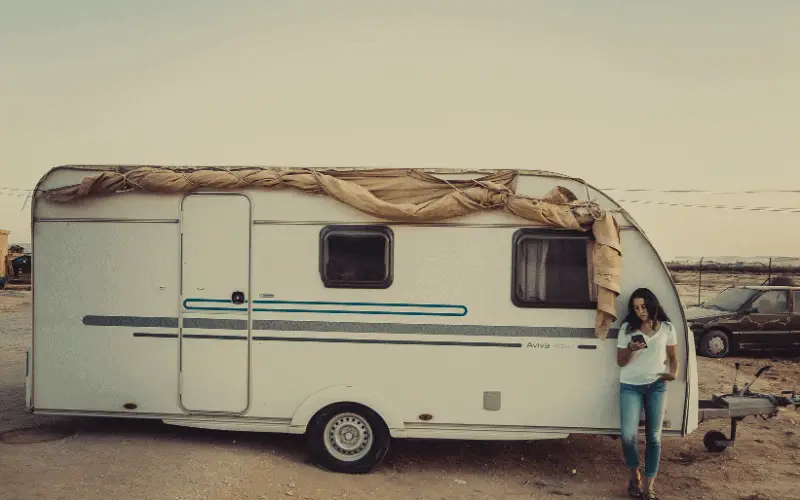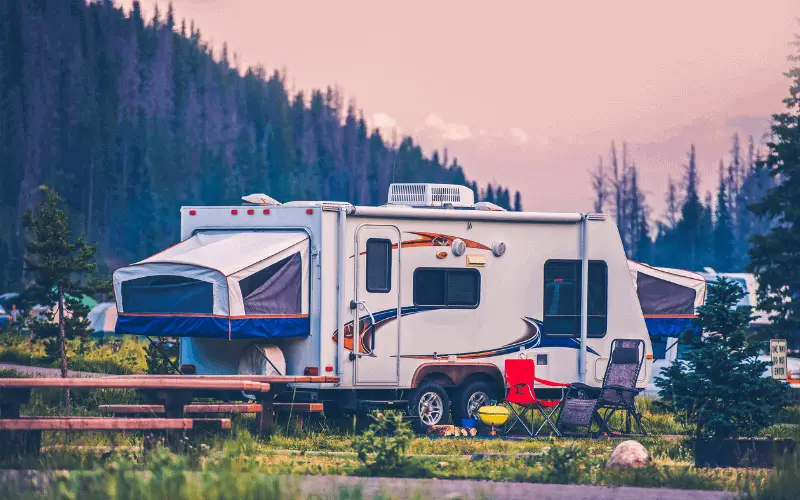Published Date: September 6, 2020
Last Updated on April 18, 2023 by Camper Front
How much does a 30 foot camper weigh? The average weight of a 30-foot camper ranges from 5,800 to 7,800 pounds; it all depends on the model and make of the trailer (more about that below).
However, when trying to find out how much does a 30 foot camper weigh, it’s worth noting that most travel trailers are not exactly 30′ in length. Most dealers usually round up or down to 30′, and many times, most travel trailers listed as “31′” are, in reality, actually over 32′ in length.
That said, let’s now get to the main topic of today!
Table of Contents
How Much Does a 30 Foot Camper Weigh?
Below is the weight of different 30 foot campers:
- Catalina SBX 261BH 2018 – 30.25 feet – 6,198 pounds
- Catalina SBX 261BHS 2019 – 30.30 feet – 6,198 pounds
- Keystone RV Passport 2670BH Grand Touring travel trailer – 30 feet – 5344 pounds
- Aerolite 2520RKSL 2017 – 30 feet – 5,206
- Aspen Trail LE 26BH 2020 – 30.8” feet – 5,630 pounds
- Aspen Trail 2610RKS 2019 – 30.25 feet – 6,374 pounds
- Kodiak Ultimate 279RBSL – 30.67 feet – 6,374 pounds
Read Also: How Much Weight Do You Add to a Camper?
Factors That Affects Your Camper’s Total Weight

Construction type of your camper
There are basically two types of campers; we have those made from aluminum and those made from fiberglass. When determining how much does a 30 foot camper weigh, the construction is significant. They both have their pros and cons, but let’s get into a few details:
Fiberglass
This is a type of construction where the camper is built using a fiberglass exterior with smooth exterior sidewalls.
They are considered to be more superior and durable because the fiberglass construction has an aluminum metal structure that is more durable and lightweight, and it does a great job of holding up to various rocks that comes its way as well as other sources of potential damage.
It also has a smooth surface, which is easier to clean; it stays cleaner and maintains its shine better than aluminum. And since they look better over a longer period of time, they have a better reselling price.
The fiberglass exterior means that the internal structure of the camper is made from aluminum piping and not of wood, and this means better gas mileage.
Aluminum
This has cheap written all over it (but cheap doesn’t always mean bad). Yes, it can be easily damaged compared to fiberglass, but replacement parts are inexpensive and easy to find.
The exterior structure of shingles that makes replacing a piece with another as cheap and easy as it can get. I know the word cheap is being repeated all over but isn’t a bad product.
The only downside it has is that they often have wooden frames, which could be pretty bulky, and it could have a direct impact on your gas mileage, and it also puts additional strain on your truck and its transmission.
Read Also: How Much Does a Motorhome Weigh?
Liquid and Additional Gears
The fluids in your camper’s system add up pretty quickly and are going to contribute a significant amount of weight to your camper’s total weight.
A gallon of water weighs around 8 pounds, and your average trailer contains up to 48 gallons of freshwater. So your freshwater tank is going to add about 400 pounds of weight to your camper.
Other items like a space heater, an air conditioner, a generator capable of powering your entire travel trailer will all contribute to the additional weight.
Other days to day necessities like clothing, food items, toiletries, dishwares all need to be factored in also as they will contribute to the weight of your camper.
Slideouts
Most recent models of campers come with a sliding room system that expands the living space, this is a great addition, but it dramatically adds a lot of weight to your camper. So if your camper has a slideout, it’s a major addition as it adds roughly 800 pounds of weight to the trailer. Slideouts play a big role in the total weight and should be considered if you are wondering how much does a 30 foot camper weigh.
Important Weight Definitions to Know
There are a ton of different terminologies when it comes to knowing the weight of your camper, and it’s easy to get confused. While it is important to know how much does a 30 foot camper weigh, it is important to understand different terms regarding the weight. Here are some of the weight definitions you need to familiarize yourself with;
Gross Vehicle Weight Rating (GVWR): This is the maximum weight of the vehicle or trailer when fully loaded for travel. This includes the unloaded vehicle weight, extra equipment or accessories, cargo, passengers, liquids. The trailer and tow vehicle each have their own GVWR.
Unloaded Vehicle Weight: This is the dry weight of the camper with no gear, no fluids, and no additional items. This is the exact structure weight before it’s prepped to hit the road.
Dry Weight: Dry Weight is like Curb Weight, except all of the camper’s consumables such as washer fluid, oil, fuel, coolant, etc. are not added in the calculation.
Cargo Carrying Capacity: This is the highest amount of weight your cargo and gear should amount to. You can weigh your items separately before loading, to carefully keep track of your cargo’s weight.
Gross Combined Weight Rating: The GCWR is the total weight of absolutely everything. When you total the vehicle, everything inside the vehicle, the towing apparatus, the gears, and the trailer, it should be less than this number.
Read Also: How to Build a Lightweight Camper
Conclusion
Even after finding out how much does a 30 foot camper weigh, the weight shouldn’t be the only factor that makes you purchase one.
It should be able to hold and cater for your camping needs, and you should be able to tow it easily because a 30 foot camper cannot be towed by just any vehicle.
You should also note that there are a lot of smaller campers that can function in a 30 foot camper capacity. Factor in all your needs and ability to tow before making a final purchase.

